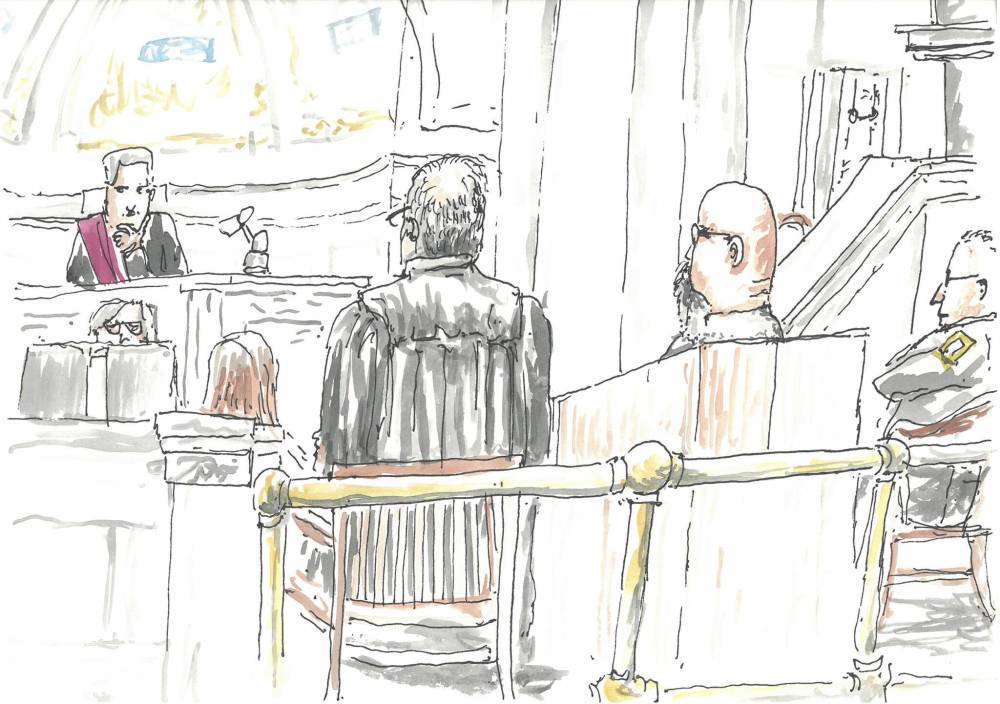Admitted serial killer’s fate in judge’s hands
Duelling psychiatrists at centre of trial’s closing arguments
Advertisement
Read this article for free:
or
Already have an account? Log in here »
To continue reading, please subscribe:
Monthly Digital Subscription
$0 for the first 4 weeks*
- Enjoy unlimited reading on winnipegfreepress.com
- Read the E-Edition, our digital replica newspaper
- Access News Break, our award-winning app
- Play interactive puzzles
*No charge for 4 weeks then price increases to the regular rate of $19.00 plus GST every four weeks. Offer available to new and qualified returning subscribers only. Cancel any time.
Monthly Digital Subscription
$4.75/week*
- Enjoy unlimited reading on winnipegfreepress.com
- Read the E-Edition, our digital replica newspaper
- Access News Break, our award-winning app
- Play interactive puzzles
*Billed as $19 plus GST every four weeks. Cancel any time.
To continue reading, please subscribe:
Add Free Press access to your Brandon Sun subscription for only an additional
$1 for the first 4 weeks*
*Your next subscription payment will increase by $1.00 and you will be charged $16.99 plus GST for four weeks. After four weeks, your payment will increase to $23.99 plus GST every four weeks.
Read unlimited articles for free today:
or
Already have an account? Log in here »
Hey there, time traveller!
This article was published 10/06/2024 (545 days ago), so information in it may no longer be current.
Jeremy Skibicki acted out of hatred and a drive to “fulfil his deviant sexual urges” when he killed four Indigenous women and repeatedly defiled their corpses, prosecutor Renee Lagimodiere told court Monday as lawyers for the Crown and defence made their final arguments in the trial of the admitted serial killer.
“Racial motivation, sexual motivation, power and control motivation… intertwined in all four killings the accused committed,” Lagimodiere told King’s Bench Chief Justice Glenn Joyal.
Skibicki has pleaded not guilty to four counts of first-degree murder in the May 2022 slayings of three Indigenous women — Rebecca Contois, Morgan Harris and Marcedes Myran — as well as a fourth unidentified woman, known as Mashkode Bizhiki’ikwe or Buffalo Woman, who police believe was slain in March 2022.
Skibicki has admitted to killing the women but argues he should be found not criminally responsible by reason of mental disorder, specifically schizophrenia. In a police interview video recorded after his May 17, 2022 arrest, Skibicki admitted strangling or drowning the victims in his McKay Avenue suite, having sex with their bodies, and then discarding their remains in nearby garbage bins. Skibicki has said he dismembered Contois and Myran.
YouTube Dr. Sohom Das in a video from his YouTube channel.
Lagimodiere spent much of her submission dismantling the testimony of the sole witness for the defence, Dr. Sohom Das, a U.K.-based forensic psychiatrist who concluded Skibicki committed the killings under the influence of schizophrenia-driven delusions.
Das was the subject of heated cross-examination as it was revealed he hosts a YouTube channel called ‘A Psych for Sore Minds’ on which he posted “tongue in cheek” videos that included flippant discussions of what not to do if you are arrested and how to fake mental illness.
Lagimodiere urged Joyal to give Das’s testimony little or no weight, saying it “must be evaluated in clear light of concerns raised about his professionalism.”
Das’s involvement in the case started with an “engagement letter” from the defence stating Skibicki had been diagnosed with schizophrenia, when no such prior diagnosis could be confirmed, Lagimodiere alleged, “raising the question of confirmation bias.”
FACEBOOK Jeremy Anthony Michael Skibicki.
Court has heard Skibicki claimed to believe he was on a mission from God and had killed his “impure” victims to get them into heaven. Skibicki said he had sex with the bodies multiple times over a period of several hours. He said the sex acts were meant to “sanctify the body” and were “acts of love.”
Another forensic psychiatrist, Dr. Gary Chaimowitz, testifying for the prosecution, told court there was no evidence to suggest Skibicki had ever been diagnosed with schizophrenia. Chaimowitz said it wasn’t delusions that drove Skibicki to kill the women, it was his desire to have sex with dead people, or “homicidal necrophilia.”
Das failed to consider any “alternative hypothesis,” and didn’t address actions by Skibicki after the killings that were suggestive of someone fully aware what they had done was wrong, including a Facebook post to his ex-wife saying he “could be doing three life sentences.”
“He simply accepted… (Skibicki) wasn’t faking (schizophrenia),” Lagimodiere said.
Defence lawyer Leonard Tailleur argued medical records from several hospitals, medical clinics and other sources include references to schizophrenia dating back decades. Joyal pressed Tailleur on that point, asking what evidence there was to show Skibicki himself wasn’t the sole source of the schizophrenia claims.
Tailleur defended Das’s findings, alleging it was Chaimowitz who was biased in favour of the prosecution.
“He took all the parts he wanted to fit into his hypothesis and threw out everything else,” Tailleur said.
Court heard Skibicki told both Das and Chaimowitz that voices directed him to kill the women. He made no such assertion in his police interview immediately after his arrest.
Court sketch by James Culleton King’s Branch Justice Glenn Joyal oversees accused serial killer Jeremy Skibicki’s trial.
Joyal said Skibicki would have had to be sexually aroused to have assaulted the dead victims in the way he has described, something that is at odds with his claim his actions were guided by voices.
“Delusions don’t arouse,” Joyal said. “How is it that there is the possibility of having the level of arousal to have intercourse with corpses as often as he did?… That’s the question that hangs in the air of this courtroom.”
The sex acts “were part of his delusion,” and “merely incidental” to the killings,” Tailleur said.
The mandatory sentence for first-degree murder is life in prison with no chance of parole for 25 years. If Skibicki is found not criminally responsible for the killings, his case will be handed to the Manitoba Criminal Code Review Board, who will decide if and when he should be released from a secure medical facility.
The defence conceded that if Skibicki is found criminally responsible for his actions he should be convicted on all four counts of first-degree murder.
Prosecutor Chris Vanderhooft said Skibicki’s “horrifying confession” was verified by an “intensive and lengthy” police investigation.
“Mr. Skibicki told police that he preyed on Indigenous women, that he was motivated by racial beliefs and that he defiled the corpses of each of his victims before disposing of them like garbage.”
Skibicki’s police interview also included solid evidence of his state of mind and clear thinking, Vanderhooft said, including how he targeted his victims at homeless shelters and steps he took to avoid detection.
“He didn’t select these people by accident, these weren’t crimes of opportunity,” Vanderhooft said.
On May 5, 2022, just 12 hours after he was seen returning to his apartment with his third victim, Marcedes Myran, Skibicki sat down at his computer, opened a search window and typed: what is the definition of a serial killer.
“In answer to Mr Skibicki’s own question… the answer Mr. Skibicki is: you,” Vanderhooft said.
Joyal will deliver his ruling in the case on July 11.
dean.pritchard@freepress.mb.ca

Dean Pritchard is courts reporter for the Free Press. He has covered the justice system since 1999, working for the Brandon Sun and Winnipeg Sun before joining the Free Press in 2019. Read more about Dean.
Every piece of reporting Dean produces is reviewed by an editing team before it is posted online or published in print — part of the Free Press‘s tradition, since 1872, of producing reliable independent journalism. Read more about Free Press’s history and mandate, and learn how our newsroom operates.
Our newsroom depends on a growing audience of readers to power our journalism. If you are not a paid reader, please consider becoming a subscriber.
Our newsroom depends on its audience of readers to power our journalism. Thank you for your support.










